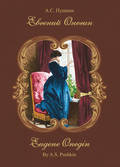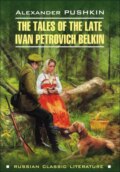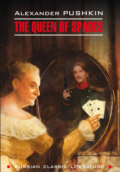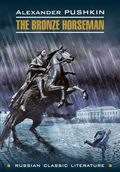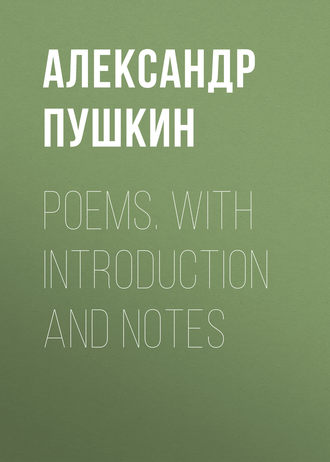
Александр Пушкин
Poems. With Introduction and Notes
Poems: miscellaneous
THE BIRDLET
IV. 133
In exile I sacredly observe
The custom of my fatherland:
I freedom to a birdlet give
On Spring's holiday serene.
And now I too have consolation:
Wherefore murmur against my God
When at least to one living being
I could of freedom make a gift?
1823.
THE NIGHTINGALE
IV. 145
In silent gardens, in the spring, in the darkness of the night
Sings above the rose from the east the nightingale;
But dear rose neither feeling has, nor listens it,
But under its lover's hymn waveth it and slumbers.
Dost thou not sing thus to beauty cold?
Reflect, O bard, whither art thou striding?
She neither listens, nor the bard she feels.
Thou gazest? Bloom she does; thou callest?—
Answer none she gives!
1827.
THE FLOWERET
IV. 95
A floweret, withered, odorless
In a book forgot I find;
And already strange reflection
Cometh into my mind.
Bloomed, where? when? In what spring?
And how long ago? And plucked by whom?
Was it by a strange hand? Was it by a dear hand?
And wherefore left thus here?
Was it in memory of a tender meeting?
Was it in memory of a fated parting?
Was it in memory of a lonely walk?
In the peaceful fields or in the shady woods?
Lives he still? Lives she still?
And where their nook this very day?
Or are they too withered
Like unto this unknown floweret?
1828.
THE HORSE
IV. 271
Why dost thou neigh, O spirited steed,
Why thy neck so low,
Why thy mane unshaken
Why thy bit not gnawed?
Do I then not fondle thee?
Thy grain to eat art thou not free?
Is not thy harness ornamented,
Is not thy rein of silk,
Is not thy shoe of silver,
Thy stirrup not of gold?
The steed in sorrow answer gives:
Hence am I quiet
Because the distant tramp I hear,
The trumpet's blow and the arrow's whizz
And hence I neigh, since in the field
No longer feed I shall,
Nor in beauty live and fondling,
Neither shine with harness bright.
For soon the stern enemy
My harness whole shall take
And the shoes of silver
Tear he shall from feet mine light.
Hence it is that grieves my spirit:
That in place of my chaprak
With thy skin shall cover he
My perspiring sides.
1833.
TO A BABE
IV. 144
Child, I dare not over thee
Pronounce a blessing;
Thou art of consolation a quiet angel
May then happy be thy lot....
THE POET
(IV. 2)
Ere the poet summoned is
To Apollo's holy sacrifice
In the world's empty cares
Engrossed is half-hearted he.
His holy lyre silent is
And cold sleep his soul locks in;
And of the world's puny children,
Of all puniest perhaps is he.
Yet no sooner the heavenly word
His keen ear hath reached,
Than up trembles the singer's soul
Like unto an awakened eagle.
The world's pastimes him now weary
And mortals' gossip now he shuns
To the feet of popular idol
His lofty head bends not he.
Wild and stern, rushes he,
Of tumult full and sound,
To the shores of desert wave,
Into the widely-whispering wood.
1827.
TO THE POET
SONNET
(IV. 9)
Poet, not popular applause shalt thou prize!
Of raptured praise shall pass the momentary noise;
The fool's judgment hear thou shalt, and the cold mob's laughter—
Calm stand, and firm be, and—sober!
Thou art king: live alone. On the free road
Walk, whither draws thee thy spirit free:
Ever the fruits of beloved thoughts ripening,
Never reward for noble deeds demanding.
In thyself reward seek. Thine own highest court thou art;
Severest judge, thine own works canst measure.
Art thou content, O fastidious craftsman?
Content? Then let the mob scold,
And spit upon the altar, where blazes thy fire.
Thy tripod in childlike playfulness let it shake.
THE THREE SPRINGS
IV. 134
In the world's desert, sombre and shoreless
Mysteriously three springs have broken thro':
Of youth the spring, a boisterous spring and rapid;
It boils, it runs, it sparkles, and it murmurs.
The Castalian Spring, with wave of inspiration
In the world's deserts its exiles waters;
The last spring—the cold spring of forgetfulness,
Of all sweetest, quench it does the heart's fire.
1827.
THE TASK
IV. 151
The longed-for moment here is. Ended is my long-yeared task.
Why then sadness strange me troubles secretly?
My task done, like needless hireling am I to stand,
My wage in hand, to other task a stranger?
Or my task regret I, of night companion silent mine,
Gold Aurora's friend, the friend of my sacred household gods?
1830.
SLEEPLESSNESS
IV. 101
I cannot sleep, I have no light;
Darkness 'bout me, and sleep is slow;
The beat monotonous alone
Near me of the clock is heard.
Of the Fates the womanish babble,
Of sleeping night the trembling,
Of life the mice-like running-about,—
Why disturbing me art thou?
What art thou, O tedious whisper?
The reproaches, or the murmur
Of the day by me misspent?
What from me wilt thou have?
Art thou calling or prophesying?
Thee I wish to understand,
Thy tongue obscure I study now.
1830.
[QUESTIONINGS.]
IV. 98
Useless gift, accidental gift,
Life, why given art thou me?
Or, why by fate mysterious
To torture art thou doomed?
Who with hostile power me
Out has called from the nought?
Who my soul with passion thrilled,
Who my spirit with doubt has filled?…
Goal before me there is none,
My heart is hollow, vain my mind
And with sadness wearies me
Noisy life's monotony.
1828.
[CONSOLATION.]
IV. 142
Life,—does it disappoint thee?
Grieve not, nor be angry thou!
In days of sorrow gentle be:
Come shall, believe, the joyful day.
In the future lives the heart:
Is the present sad indeed?
'T is but a moment, all will pass;
Once in the past, it shall be dear.
1825.
[FRIENDSHIP.]
III. 201
Thus it ever was and ever will be,
Such of old is the world wide:
The learned are many, the sages few,
Acquaintance many, but not a friend!
[FAME.]
III. 102
Blessed who to himself has kept
His creation highest of the soul,
And from his fellows as from the graves
Expected not appreciation!
Blessed he who in silence sang
And the crown of fame not wearing,
By mob despised and forgotten,
Forsaken nameless has the world!
Deceiver greater than dreams of hope,
What is fame? The adorer's whisper?
Or the boor's persecution?
Or the rapture of the fool?
1824.
THE ANGEL
IV. 108
At the gates of Eden a tender angel
With drooping head was shining;
A demon gloomy and rebellious
Over hell's abyss was flying.
The Spirit of Denial, the Spirit of Doubt
The Spirit of Purity espied;
And a tender warmth unwittingly
Now first to know it learned he.
Adieu, he spake, thee I saw:
Not in vain hast thou shone before me;
Not all in the world have I hated,
Not all in the world have I scorned.
1827.
[HOME-SICKNESS.]
III. 131
Mayhap not long am destined I
In exile peaceful to remain,
Of dear days of yore to sigh,
And rustic muse in quiet
With spirit calm to follow.
But even far, in foreign land,
In thought forever roam I shall
Around Trimountain mine:
By meadows, river, by its hills,
By garden, linden nigh the house.
Thus when darkens day the clear,
Alone from depths of grave,
Spirit home-longing
Into the native hall flies
To espy the loved ones with tender glance.
1825.
[INSANITY.]
III. 149
God grant I grow not insane:
No, better the stick and beggar's bag:
No, better toil and hunger bear.
Not that I upon my reason
Such value place; not that I
Would fain not lose it.
If freedom to me they would leave
How I would lasciviously
For the gloomy forest rush!
In hot delirium I would sing
And unconscious would remain
With ravings wondrous and chaotic.
And listen would I to the waves
And gaze I would full of bliss
Into the empty heavens.
And free and strong then would I be
Like a storm the fields updigging,
Forest-trees uprooting.
But here's the trouble: if crazy once,
A fright thou art like pestilence,
And locked up now shalt thou be.
To a chain thee, fool, they 'll fasten
And through the gate, a circus beast,
Thee to nettle the people come.
And at night not hear shall I
Clear the voice of nightingale
Nor the forest's hollow sound,
But cries alone of companions mine
And the scolding guards of night
And a whizzing, of chains a ringing.
[DEATH-THOUGHTS.]
IV. 93
Whether I roam along the noisy streets
Whether I enter the peopled temple,
Whether I sit by thoughtless youth,
Haunt my thoughts me everywhere.
I say, Swiftly go the years by:
However great our number now,
Must all descend the eternal vaults,—
Already struck has some one's hour.
And if I gaze upon the lonely oak
I think: the patriarch of the woods
Will survive my passing age
As he survived my father's age.
And if a tender babe I fondle
Already I mutter, Fare thee well!
I yield my place to thee. For me
'T is time to decay, to bloom for thee
Every year thus, every day
With death my thought I join
Of coming death the day
I seek among them to divine.
Where will Fortune send me death?
In battle? In wanderings, or on the waves
Or shall the valley neighboring
Receive my chilled dust?
But tho' the unfeeling body
Can everywhere alike decay,
Still I, my birthland nigh
Would have my body lie.
Let near the entrance to my grave
Cheerful youth be in play engaged,
And let indifferent creation
With beauty shine there eternally.
1829.
[RIGHTS.]
IV. 10
Not dear I prize high-sounding rights
By which is turned more head than one;
Not murmur I that not granted the Gods to me
The blessed lot of discussing fates,
Of hindering kings from fighting one another;
And little care I whether free the press is.
All this you see are words, words, words!
Other, better rights, dear to me are;
Other, better freedom is my need....
To depend on rulers, or the mob—
Is not all the same it? God be with them!
To give account to none; to thyself alone
To serve and please; for power, for a livery
Nor soul, nor mind, nor neck to bend:
Now here, now there to roam in freedom
Nature's beauties divine admiring,
And before creations of art and inspiration
Melt silently in tender ecstasy—
This is bliss, these are rights!....
THE GYPSIES
IV. 157
Over the wooded banks,
In the hour of evening quiet,
Under the tents are song and bustle
And the fires are scattered.
Thee I greet, O happy race!
I recognize thy blazes,
I myself at other times
These tents would have followed.
With the early rays to-morrow
Shall disappear your freedom's trace,
Go you will—but not with you
Longer go shall the bard of you.
He alas, the changing lodgings,
And the pranks of days of yore
Has forgot for rural comforts
And for the quiet of a home.
THE DELIBASH
IV. 155
Cross-firing behind the hills:
Both camps watch, theirs and ours;
In front of Cossaks on the hill
Dashes 'long brave Delibash
O Delibash, not to the line come nigh,
Do have mercy on thy life;
Quick 't is over with thy frolic bold,
Pierced thou by the spear shalt be
Hey, Cossak, not to battle rush
The Delibash is swift as wind;
Cut he will with crooked sabre
From thy shoulders thy fearless head.
They rush with yell: are hand to hand;
And behold now what each befalls:
Already speared the Delibash is
Already headless the Cossak is!
Notes
MY PEDIGREE. (Page 61.)
These lines owe their origin to a public attack on Pushkin by Bulgarin, a literary magnate of those days. Bulgarin disliked Pushkin and, therefore, saw no merit in his poetry. But unable to argue against his poetry, he argued against Pushkin's person, and abused the poet for his fondness to refer to his ancient ancestry. Stung to the quick by a childish paragraph in Bulgarin's organ, "The Northern Bee," Pushkin wrote these lines. But on their publication which, I think, took place some time after they were written, though they went into circulation immediately, they made much bad blood. The Menshchikofs did not like to be reminded of the cakes their ancestor sold, nor the Rasumofskys of the fact that their countship was earned by the good voice of the first of that name. And the Kutaissoffs did not like to be told that Count Kutaissoff was originally Paul's shoe-black. The very pride in his ancestors, which made Pushkin ridiculous in the eyes of his enemies, made him forget the fact that selling cakes and blacking shoes, even though they be an emperor's, is by no means a thing to be ashamed of; and that, even if it were a thing to be ashamed of, the descendants of evil-doers are by no means responsible for the deeds of their ancestors.... The poem, therefore, is an excellent document, not only for the history of the nobility of Russia, but also for that of poor Pushkin's soul.
Nobleman by cross. There are two kinds of noblemen in Russia: those who inherit their title, and those who acquire it. Whoever attains a certain cross as a reward for his service under the government (not, alas, the cross of true nobility, Christ's cross!) becomes thereby a "nobleman."
Our nobility but recent is: the more recent it, the nobler 't is. This was written fifty years ago, and thousands of miles away from here. But one would almost believe these lines written in our day, and at no great distance from Commonwealth Avenue,—so true is it that man remains, after all, the same in all climes, at all times....
Of Nizhny Novgorod the citizen plain. The butcher Minin is here meant, who, with Prince Pozharsky, delivered Moscow from the Poles just before the Romanoffs were called to the throne.
We upon it laid our hands. Six Pushkins signed this call, and two had to lay their hand to the paper, because they could not write their own names.
Simply Pushkin, not Moussin. The Moussin-Pushkins of that day were a very rich and influential family.
MY MONUMENT. (Page 64.)
In its present form, this poem did not appear till 1881. After Pushkin's death it appeared only when altered by Zhukofsky in several places. The Alexander Column being the tallest monument in Russia, Pushkin, writing for Russians, used that as an illustration; but the government could not let the sacrilege pass,—of a poet's monument ever being taller, even figuratively, than a Russian emperor's. In 1837, therefore, the poet was made to say, "Napoleon's column." The line in the fourth stanza, which speaks of Freedom, was altered to "That I was useful by the living charm of verse," and in this mutilated form this stanza is engraved on the poet's monument in Moscow, unveiled in 1880.
MY MUSE. (Page 66.)
I originally passed over this poem as unworthy of translation, because I thought it not universal enough; because it seemed to me to express not the human heart, but the individual heart,—Pushkin's heart. But the great Byelinsky taught me better. He quotes these lines as a marvel of classic, of Greek art. "See," he exclaims, "the Hellenic, the artistic manner (and this is saying the same thing) in which Pushkin has told us of his call, heard by him even in the days of his youth. Yes, maugre the happy attempts of Batushkof in this direction before Pushkin's day, such verses had not been seen till Pushkin in the Russian land!" And Byelinsky is right. He saw. The great critic is thus an eye-opener, because he sees his author, and because seeing him he cannot help loving him. For if men truly knew one another (assuming them to be unselfish), they would love one another.... A hater is blind though he sees; a lover sees though he be blind. See, also, about this piece, Introduction, § 4.
MY DEMON. (Page 67.)
To this poem Pushkin added a note, which he intended to send to the periodical press, as if it were the comment of a third person. Referring to the report that the poet had a friend of his in mind when he wrote this poem, and used Rayefsky as a model, he says: "It seems to me those who believe this report are in error; at least, I see in 'The Demon' a higher aim, a moral aim. Perhaps the bard wished to typify Doubt. In life's best period, the heart? not as yet chilled by experience, is open to everything beautiful. It then is trustful and tender. But by-and-by the eternal contradictions of reality give birth to doubt in the heart; this feeling is indeed agonizing, but it lasts not long.... It disappears, but it carries away with it our best and poetic prejudices of the spirit." [Are they best, if they are prejudices? Is illusion truly poetic?—I. P.] Not, therefore, in vain has Goethe the Great given the name the Spirit of Denial to man's eternal enemy. And Pushkin wished to typify the Spirit of Denial.
REGRET. (Page 69.)
See Introduction, §§ 16, 25.
THE BIRDLET. (Page 97.)
This piece is not found among Pushkin's Lyrical Poems. It is a song taken from a longer Narrative Poem, called "The Gypsies."
LOVE. (Page 113.)
This poem is Pushkin all over. In four lines he has given a whole drama with a world of pathos and tenderness in it. These four lines give more instruction in the art of story-telling than volumes on the "Art of Fiction." A magazine writer, who of the same incidents would have woven out some twenty pages (of which no fewer than nineteen and three-quarters would have been writ for the approval of check-book critic, rather than of the art critic), would have really told less than Pushkin has here told,—so true is the preacher's criticism on his own sermon: "Madame, if it had been shorter by half, it would have been twice as long!"
JEALOUSY. (Page 114.)
Of this piece I have already spoken in the Preface, § 7.
IN AN ALBUM. (Page 116.)
This is an excellent example of Pushkin's sentiment, of which I spoke in the Introduction, Chapter III. It is all the more entitled to the consideration of Anglo-Saxon a priori sentiment-haters (it is so easy to keep to a priori judgments, they are so convenient; they save discussion!) because Pushkin wrote this piece when fully matured, at the age of thirty, when his severe classic taste was already formed.
FIRST LOVE. (Page 120.)
These lines are taken from the Narrative Poem, "The Prisoner of the Caucasus."
SIGNS. (Page 124.)
Of the more-than-Egyptian number of plagues with which poor Pushkin's soul was afflicted, superstition was one. He believed in signs, and sometimes gave up a journey when a hare ran across his road. Owing to this superstition he once gave up a trip to St. Petersburg, which probably would have cost him his life, had he made it. For on hearing of the December rebellion, in which many of his friends took part, he started for the capital, but the hare....
ELEGY. (Page 132.)
The fourth volume of Pushkin's Works, in which this poem was first published, struck Byelinsky with the poverty of its contents. "But in the fourth volume of Pushkin's Poems," says he, "there is one precious pearl which reminds us of the song of yore, of the bard of yore. It is the elegy, 'The extinguished joy of crazy years.' Yes! such an elegy can redeem not only a few tales, but even the entire volume of poetry!" … (Byelinsky's Works, ii. 194.)
LOVE AND FREEDOM. (Page 137.)
In the original this poem is called, "To Countess N. V. Kotshubey."
INSPIRING LOVE. (Page 139.)
In the original this piece is headed, "To A. P. Kern."
THE GRACES. (Page 141.)
Addressed to Princess S. A. Urussov.
TO THE POET. (Page 153.)
This is the only poem Turgenef quotes in his speech at the unveiling of the Pushkin monument in 1880. "Of course," he said, "you all know it, but I cannot withstand the temptation to adorn my slim, meagre prosy speech with this poetic gold."
THE TASK. (Page 155.)
Byelinsky, who has taught me to appreciate much in Pushkin which I otherwise would not have appreciated, speaks of this little piece as "especially excellent" among Pushkin's anthological poems, written in hexameter, and says, that a breath antique blows from them. Well, I cannot agree with Byelinsky. There is, doubtless, a sentimentlet in the piece,—a germ; but it is only a germ, incomplete, immature. I would not have translated it (since its beauty, whatever that be, it owes entirely to its form, which is untranslatable), but for the sake of the reader, in justice to whom, a poem so highly thought of by Byelinsky ought to be given, whatever my opinion of it.
QUESTIONINGS. (Page 157.)
In the original this piece is headed, "26 May, 1828."
FAME. (Page 160.)
The first cantos of Eugene Onyegin were issued with the "Dialogue between the Bookseller and the Poet" as a preface. This poem is one of the arguments of the poet in the dialogue; and, as it is an independent song in itself, I have not hesitated to treat it as such.
HOME-SICKNESS. (Page 162.)
In the original these lines are entitled, "To P. A. Ossipova."
DEATH-THOUGHTS. (Page 165.)
In the original this poem is headed, "Stanzas."
RIGHTS. (Page 167.)
In the original this is called, "From VI. Pindemonte." But this is an original piece by Pushkin; at first he called it, "From Alfred Musset." Evidently the censorship was likely to pass it as a work of a foreign author where it would not as one of Pushkin; to his political convictions Pushkin never, indeed, did dare to give free expression. He never deliberately misled the government, but he did at times lead it to believe more in his loyalty than was strictly in accordance with the facts.



